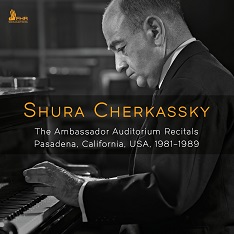Der amerikanisch-ukrainische Pianist Shura Cherkassky (1909-1995) gab zwischen 1981 und 1989 vier Klavierabende im Ambassador Auditorium in Pasadena, Kalifornien. Er war damals zwischen 72 und 80 Jahre alt. Und wenn wir uns gleich dem Klavierabend des 80-Jährigen zuwenden, ist viel Staunenswertes angesagt.
Die flinken Finger in Chopins Tarantella sind sicher der Beweis, dass der Pianist an Virtuosität nichts eingebüßt hatte. Doch das Ereignis dieses Abend ist gewiss die 2. Ungarische Rhapsodie von Franz Liszt, deren Verbunko-Charakter nicht viele Pianisten so deutlich haben werden lassen. Das ist Nervenkitzel pur, ein wahnsinnig schillerndes, phantasievolles und kapriziöses pianistisches Feuerwerk! Cherkassy bringt die tänzerische Stimmung der Musik wie nicht viele andere zum Ausdruck. Die rhapsodische Qualität des Spiels wirkt zudem, als wäre das Stück auf der Bühne des Ambassador Auditoriums improvisiert worden. Und das gilt auch für die anderen Werke des Abends.
Wenn wir dann zurückgehen zum ganzen Chopin Recital von 1981 mit einigen ganz tollen Interpretationen, darunter die der Ersten Ballade, dann bedauern wir den doch sehr störenden Klang des scheppernden Klaviers.
1982 ist die Tonqualität viel besser und nach der feinen Darbietung der Lully-Suite explodiert das Klavier mit dem Scherzo à capriccio von Mendelssohn, ehe Cherkassy dann die ganze Grandeur von Tchaikovskys selten gespielter Klaviersonate intensiv zum Ausdruck bringt.
Er beschließt dieses Recital mit einer eigenwilligen Interpretation von Chopins Polonaise-Fantaisie und einer nicht weniger persönlichen Darbietung der Vierten Ballade, in der dynamische Freiheiten und rhythmische Eigenarten vieles aufregend klingend lassen, was man sonst nicht so hört.
Im Klavierabend von 1982 fällt auch eine absonderlich drängend und wirbelnd gespielte Grande Valse von Chopin auf.
Der Mitschnitt des Klavierabends von 1987 fasziniert durch eine wunderbar freie und spannende Interpretation von Prélude, Choral et fugue von César Franck sowie vor allem durch beine der besten und spontansten Darbietungen von Schumanns Carnaval. Cherkassys kontinuierliches, also durch den Zyklus hindurch pausenloses Spiel hat eine ungemein kühne Art von Raffinesse und besonderem Charme, die sofort die Aufmerksamkeit des Zuhörers erregt. Und sein fast improvisiertes Spiel führt zu einer packenden Unvorhersehbarkeit.
The American-Ukrainian pianist Shura Cherkassky (1909-1995) gave four piano recitals at the Ambassador Auditorium in Pasadena, California, between 1981 and 1989. He was between 72 and 80 years old at the time. And if we turn straight to the 80-year-old’s piano recital, there is much to marvel at. The nimble fingers in Chopin’s Tarantella are certainly proof that the pianist had lost nothing of his virtuosity. But the event of the evening is certainly Franz Liszt’s 2nd Hungarian Rhapsody, the Verbunko character of which not many pianists have made so clear. This is pure thrills, an exceptionally dazzling, imaginative and capricious pianistic firework display! Cherkassy expresses the dance-like mood of the music like not many others. The rhapsodic quality of the playing also gives the impression that the piece was improvised on the stage of the Ambassador Auditorium. And this also applies to the other works of the evening.
If we then go back to the entire Chopin recital from 1981 with some really great interpretations, including the First Ballade, then we regret the very disturbing sound of the clattering piano. In 1982, the sound quality is much better and after the fine performance of the Lully Suite, the piano explodes with the Scherzo à capriccio by Mendelssohn, before Cherkassy then intensely expresses the full grandeur of Tchaikovsky’s rarely played Piano Sonata. He concludes this recital with an idiosyncratic interpretation of Chopin’s Polonaise-Fantaisie and a no less personal performance of the Fourth Ballade, in which dynamic freedom and rhythmic peculiarities make many things sound exciting that are not usually heard in this way. In the piano recital from 1982, an unusually urgent and whirling performance of Chopin’s Grande Valse also stands out.
The recording of the 1987 piano recital fascinates with a wonderfully free and exciting interpretation of César Franck’s Prélude, Choral et fugue and, above all, with one of the best and most spontaneous performances of Schumann’s Carnaval. Cherkassy’s continuous, i.e. non-stop playing throughout the cycle has an uncommonly bold kind of sophistication and special charm that immediately grabs the listener’s attention. And his almost improvised playing leads to a gripping unpredictability.
29 APRIL 1981
Frédéric Chopin: Ballade No. 1, Op. 23 + Nocturnes Nr. 2, op. 9/2 & Nr. 15 op. 55/1 + Andante spianato et Grande Polonaise brillante, op. 22 + Fantaisie op. 49 + Impromptu No. 2, op. 36 + 8 Fantaisie-impromptu in C sharp minor, Op. 66 +9 Scherzo No. 2 in B flat minor, Op. 31 + Nocturne No. 3 in B major, Op. 9, No. 3 (+ Waltz No. 5 in A flat major, Op. 42, ‘Grande valse’
13 JANUARY 1982
Jean-Baptiste Lully: Suite de Pièces – Felix Mendelssohn: Scherzo a capriccio, WoO 3 + Peter Tchaikovsky: Grand Sonata, Op. 37 – Frédéric Chopin: Polonaise No. 7, Op. 61 (Polonaise-fantaisie) + Ballade No. 4 in F minor, Op. 52 + Waltz No. 5 in A flat major, Op. 42, ‘Grande valse’ (1840) – Józef Hofmann: Kaleidoskop – Franz Liszt: Réminiscences de Don Juan, S418 – Shura Cherkassy: Prélude pathétique
18 NOVEMBER 1987
César Franck: Prélude, Choral et Fugue, M. 21 – Robert Schumann: Carnaval, Op. 9 – Serge Rachmaninov: Variations on a Theme of Corelli, Op. 42 (1931) – Józef Hofmann: Kaleidoskop – Frédéric ChopinNocturne No. 15 in F minor, Op. 55, No. 1 + Barcarolle, Op. 60 – Franz Liszt: Faust Walzer – Isaac Albeniz: España, Op. 165 (Tango, Arr. Godovsky) – Serge Rachmaninov: Polka de W.R. – Peter Tchaikovsky: October: Autumn Song
2 NOVEMBER 1989
Georg Friderich Händel: Air and Variations, ‘The Harmonious Blacksmith’ – Robert Schumann: Fantasy in C major, Op. 17 (Langsam getragen. Durchweg leise zu halten) – Peter Tchaikovsky: Thème original et variations in F major – Serge Rachmaninopv: Barcarolle – Franz Liszt: Hungarian Rhapsody No. 2 S244/R106 – Isaac Albeniz: Tango (arr. Leopold Godowsky) – Frédéric Chopin: Tarentelle in A flat major, Op. 43




















